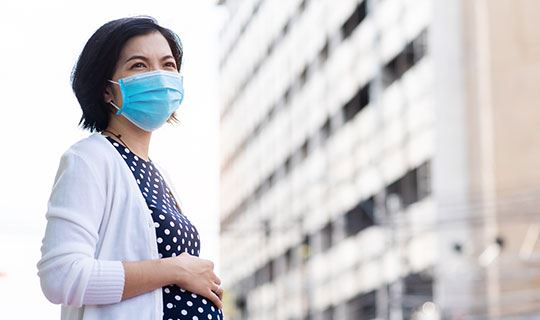Pregnancy, New Motherhood and COVID-19

The COVID-19 pandemic raises a host of concerns for women who are pregnant or who have recently given birth. Changes in the body during and after pregnancy may make women more vulnerable to respiratory illnesses like COVID-19.
How can you stay healthy and give your baby the best chance of a healthy future? What if you get COVID-19 while pregnant? Are COVID-19 vaccines safe during pregnancy?
Knowing the answers to these questions and more can help you understand the risks, take preventive measures to avoid getting sick, and know what to do if you do feel sick.
How does COVID-19 affect pregnancy?
Women who get COVID-19 while pregnant have a slightly higher chance of becoming severely ill than people who are not pregnant. They are slightly more likely to:
- Have blood clots
- Need care in an intensive care unit (ICU)
- Require a ventilator
- Have an increased risk of preterm birth (delivering the baby earlier than 37 weeks) and stillbirth
If a woman has other complications of pregnancy, her health risk may be even higher if she becomes infected with COVID. For example, women with gestational diabetes or preeclampsia who are already in a high-risk category are more likely to become severely ill if they contract COVID-19.
How do I avoid getting COVID-19 while pregnant?
- Get a COVID-19 vaccine
- Wash your hands or use hand sanitizer often
- Wear a mask in public places or inside when it is not possible to be socially distanced from others
- Avoid large gatherings of people
- Avoid exposure to individuals who have COVID symptoms or who have recently tested positive for COVID
Even if you are vaccinated, the COVID virus is mutating and new variants continue to arise. Preventive measures like masking, handwashing and social distancing are simple ways to reduce your risk of getting sick with COVID and other contagious diseases.
Are COVID vaccines safe during pregnancy? Should I get a booster shot if I am pregnant?
COVID vaccines are safe and effective during pregnancy. The Centers for Disease Control and Prevention strongly recommends that pregnant women get vaccinated and get booster shots. The antibodies that a woman’s body produces after vaccination can travel to the baby before birth, and through breast milk after birth, which will help the baby fight off infection.
Learn more about the COVID-19 vaccine and maternal immunization.
I’m pregnant. What do I do if I feel like I’m getting COVID symptoms?
COVID symptoms range from fever, aches and chills to shortness of breath, loss of taste and smell, and nausea and diarrhea. New variants may add to the list of symptoms.
The CDC has a convenient interactive assessment tool called the Coronavirus Self-Checker that can help you decide when to seek medical care.
Take a COVID test to know for sure whether you have COVID. Visit the New Jersey COVID-19 Test Site Finder for a testing location in New Jersey near you.
If you test positive for COVID-19, let your doctor know, and share any concerns you may have about your symptoms.
If I have COVID-19 while pregnant, will my baby get it?
Research in this area is ongoing, however, according to the CDC, most newborns of people who had COVID-19 during pregnancy do not have COVID-19 when they are born. Most newborns who did test positive for COVID-19 had mild or no symptoms and recovered, though some newborns did develop severe illness.
Could my baby get sick if I breastfeed while I have COVID?
Current research shows that COVID-19 is not likely to be transmitted from mother to baby in breast milk. However, the virus is highly contagious. Mothers who have COVID-19 must take proper precautions to avoid transmitting it to their babies:
- Wash hands thoroughly with soap before breastfeeding for at least 20 seconds.
- Wear a mask while breastfeeding and whenever you are within six feet of the baby.
- Consider expressing breast milk and having a healthy caregiver feed the baby.
- If expressing breast milk, wash your hands thoroughly before using the pump, and clean the pump thoroughly after each use.
These information sheets from the CDC offer advice for new mothers who have COVID-19:
I’m stressed out and anxious from being pregnant during the pandemic. What can I do for my mental health?
Being pregnant during a pandemic can be hard on your mental health. Stress and anxiety are not good for you or your baby. Here are some things you can do to lower your stress and improve your mental health.
- Preventive care. Keep all of your doctors’ appointments, get vaccinated, and wear a mask when in close contact with others and social distancing is not possible. Knowing you are doing all you can to protect yourself and your child can give you some comfort and peace of mind.
- Exercise. Talk to your doctor about appropriate exercise you can do during and after pregnancy. Exercise can help you stay fit and improve your mood.
- Support. Lean on family and friends. Join an online support group. Share your concerns and spend quality time with people who give you strength.
- Counseling. If you are really struggling and feel like it’s too hard to cope, get help.
- Medication. There are medications that can treat depression and anxiety effectively and are safe for pregnant women and for breastfeeding mothers and their babies. Consult your doctor for more information.
Choosing the right health care provider is a crucial step toward taking the best care of yourself and your baby. Find a doctor today.



